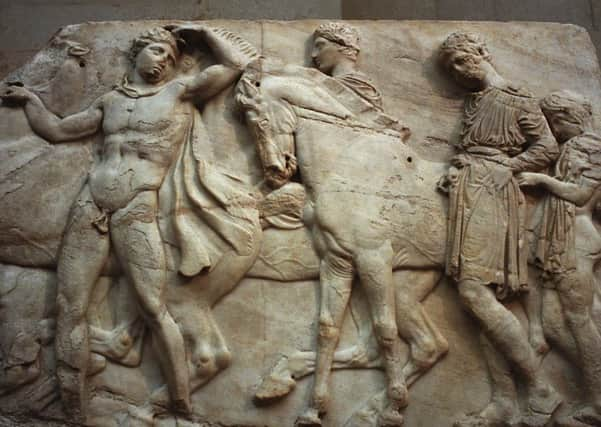Matthew Taylor: To keep hold of friends in Europe, we must be prepared to lose our Marbles


Although Lord Elgin’s bankruptcy ensured the sculptures never reached Broomhall (his ancestral seat on the Firth of Forth which he intended to adorn them with), they have been a perceived blot on Scotland’s history ever since. Even those with scant knowledge of the dispute with the British Museum assume (incorrectly) some link to the town of Elgin.
Moving forward 200 years to the present day, Britain is involved in acrimonious discussions with many of its European neighbours over how to facilitate a mutually beneficial Brexit. Scotland is keen to have a say in these discussions, but attempts at involvement are rebuffed by an increasingly inward looking UK Government.
Advertisement
Hide AdAdvertisement
Hide AdOstensibly, there is little connection between these two events – but they are both a product of Imperialism.
Elgin’s actions were symptomatic of a nation aggressively pursuing expansionist policies – a time when we believed the rules didn’t apply to us, when we could base actions purely on self-interest. Brexit, on the other hand, is, for some, a yearning for these irretrievable days of empire, an era when Britain called the shots and answered to no-one.
Scotland must look to the future. Our political outlook has become increasingly out of sync with that of England and more than ever there is a need to differentiate ourselves. Now is the time to form new alliances in Europe. To achieve this, we must continue to promote Scotland’s pro-European internationalist approach.
While we may prefer to avoid Brexit altogether, we should do the best with the hand we’ve been dealt – finding innovative ways to reach out, so that one day these favours may be returned.
One way an outward looking Scotland could assert these values is by encouraging Britain to return the Parthenon Sculptures to Greece. Such an action, extrinsic of the main negotiations, would gain support from Greece – showing that we maintain liberal values and understand the need to promote future cooperation.
Scotland can empathise with Greece on this issue in a way that Britain struggles to do. In 1996, the Stone of Scone was returned to Edinburgh Castle, 700 years after it was removed. In another case with clear parallels, the Lewis Chessmen remain split between multiple locations (including the British Museum). Scotland understands what it is like to lose cultural heritage and to campaign for its return.
At the same time, Scotland has led the way (within the UK) in the return of cultural property to its original owners. In 1999, Kelvingrove Art Gallery made the bold decision to return the Ghost Shirt to the Lakota Sioux Indians. This followed consultation with local residents who were invited to voice their opinions.
More than 400 chose to do so, overwhelmingly in favour of restitution. Although the legality of the original acquisition was not called into question, the artefact was returned because it was the right thing to do. This moral obligation often exists outside of the legal framework.
Advertisement
Hide AdAdvertisement
Hide AdScotland’s largest political party, the SNP is already strongly supportive of the reunification of the Parthenon Sculptures in Greece. In the past, Westminster MPs such as Angus Robertson and Angus MacNeil have both signed Early Day Motions expressing support for this issue. Scottish Lib Dem and Labour MPs are also sympathetic to the cause, giving it broad cross party support. Scotland can see both sides in a way that England struggles to do – putting it in the ideal position to take the lead and resolve this 200-year dispute.
We need to rebuild trust among our European neighbours. Scotland is an outward looking progressive nation with liberal values and we should make sure potential future allies are aware of this. If this is done in good faith, the people of Greece will not quickly forget such a display of solidarity.
Matthew Taylor is an architect, campaigner and member of the executive committee of Marbles Reunited.